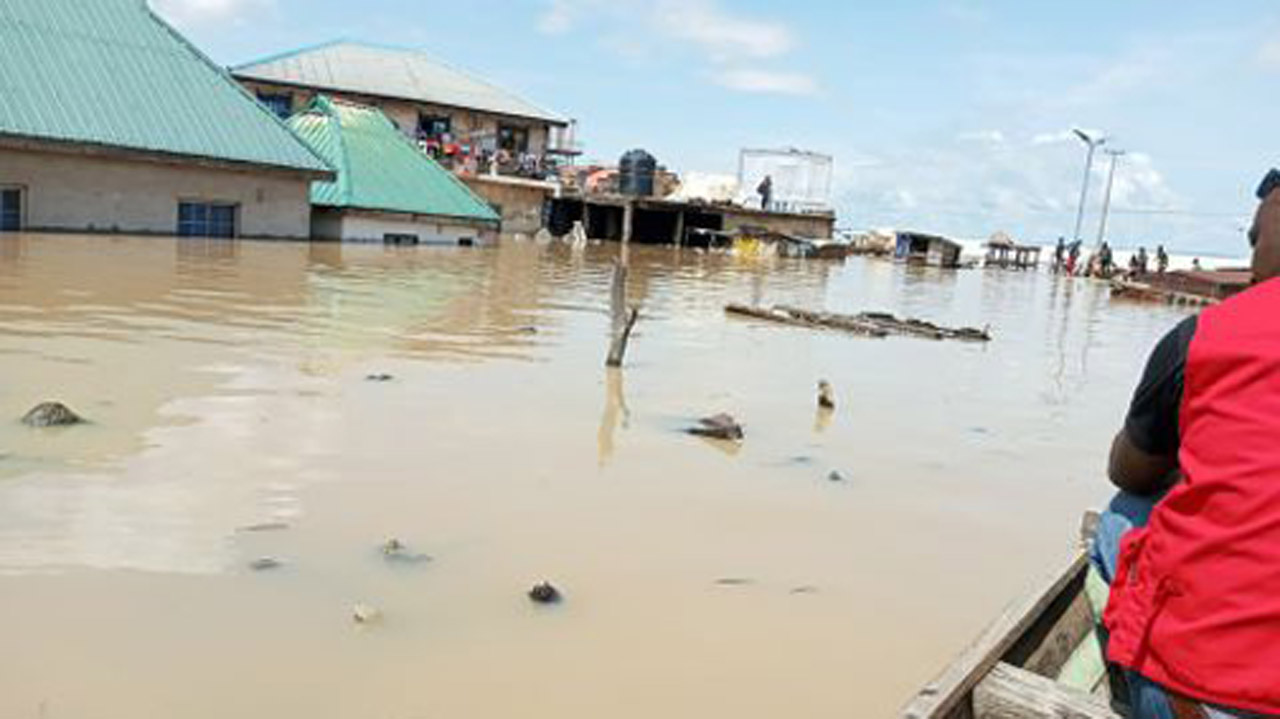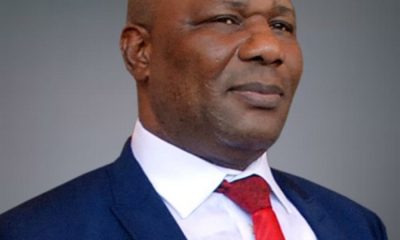COVER
Agama Tasks African Capital Markets on Climate Adaptation Gap Finance

By Tony Obiechina, Abuja
The Securities and Exchange Commission (SEC), Nigeria has stressed the need for the mobilisation of capital markets to bridge the colossal financing gap for climate adaptation in Africa.The Director-General of SEC, Dr Emomotimi Agama said this while speaking on The Role of Capital Markets in Closing Financing Gaps for Climate Adaptation presented at the African Development Bank (AfDB) meeting.
He urged project developers and private sector actors to present bankable, pipeline-ready projects with robust environmental and social metrics in a bid to closing financing gaps for climate adaptation. Agama said that African capital markets could be achieved through market integration, aligning standards and adopting the International Sustainability Standards Board (ISSB).”Closing the climate adaptation financing gap in Africa is not a distant aspiration but a development imperative, and one that demands our collective ingenuity and capital””By integrating our markets, aligning standards, adopting the ISSB framework, and mobilising institutional capital across borders, we can build a climate-resilient future for all Africans,” he said.He noted that Africa, which contributes less than four per cent of global greenhouse gas emissions, bears over 25 per cent of climate-related losses.”Experts estimate our continent faces an annual climate adaptation financing shortfall of up to $100 billion by 2030.”The 2022 Africa Economic Outlook by the AfDB estimated that the continent needs around $500 billion of climate finance by 2030.”Africa will also need to invest more than three trillion dollars in mitigation and adaptation by 2030 in order to implement its Nationally Determined Contributions.”These figures are more than statistics, they translate into lost livelihoods in the Sahel, vanishing fish stocks in the Gulf of Guinea, and more frequent flooding in Lagos and Nairobi,” he said.According to him, these figures reflect a deepening divide between vulnerability and resilience.”The stark reality is undeniable. Africa, contributing minimally to historical emissions, faces severe impacts of a changing climate which includes devastating droughts threatening food security, rising sea levels, engulfing coastlines, and intensifying storms disrupting lives and economies,” he said.Agama added that the 2023 United Nations Environment Programme Adaptation Gap Report said Africa needs between $212 and $387 billion annually for developing countries’ adaptation by 2030.”Meanwhile, our current flows and commitments are a mere fraction of this amount. For Africa specifically, the gap is immense, estimated to be up to 50 times current funding levels,” he saidAgama said in 2017, Nigeria launched its sovereign green bond, the first in sub-Saharan Africa. Within months, it was oversubscribed by 2.5 times, driven by Nigerian pension funds and diaspora investors seeking both yield and impact.This he said demonstrated that local institutional capital can be mobilised for climate projects when the right instruments and confidence-building frameworks are in place.The SEC Boss posited that the ISSB Standards serve as the game-changer as the experiences in Nigeria for example, are not only innovating climate finance products but also shaping global standards for sustainability disclosures.According to him, “The Securities and Exchange Commission (SEC) Nigeria represents the country on the International Sustainability Standards Board’s Adoption Readiness Working Group (ARWG), which was tasked with implementing the new IFRS S1 & S2 Sustainability Disclosure Standards.“The ARWG finalised its Roadmap for Adoption, publicly exposed by the Financial Reporting Council of Nigeria and SEC Nigeria between February 3 and March 14, 2024. Feedback was rigorously reviewed and integrated. The roadmap outlines early Adoption, Voluntary Adoption (January 1, 2024 through December 31, 2026) and Mandatory Adoption (beginning January 1, 2027) All entities, excluding government bodies, must comply with staggered timelines.“This leadership positions Nigeria at the forefront of transparent, comparable, and decision-useful sustainability reporting across Africa.Agama noted that adaptation finance was critically underserved due to three major reasons namely perception problem, data and measurement gaps and risk aversion.”This is where our capital markets must step in, and where the ISSB becomes vital,” he said.To scale adaptation finance, the SEC DG urged deeper regional market integration, harmonised ESG standards, and deployment of tools like credit enhancements to de-risk early-stage climate investments.“Closing the climate adaptation financing gap in Africa is not a distant aspiration but a development imperative, and one that demands our collective ingenuity and capital. The recent journey in Nigeria proves that it can be done. By integrating our markets, aligning standards, adopting the ISSB framework, and mobilising institutional capital across borders, we can build a climate-resilient future for all Africans.“Let us seize this moment, as regulators, investors, governments, standard-setters, and development partners, to deepen African capital markets and finance the resilience of our continent and our people” he added.COVER
Dangote Refinery Appoints David Bird New CEO

Dangote Group has named David Bird, former Chief Executive Officer (CEO) of Oman’s Duqm refinery, as the new chief executive of its petroleum and petrochemicals division in a bid to address operational challenges and drive its next growth phase.Bird officially assumed his role in July, taking charge of Dangote’s fuels and petrochemicals business, which launched the world’s largest single-train refinery last year.
Aliko Dangote, founder of the conglomerate, remains chairman of the refining arm and CEO of the overall group, which spans sectors including cement, fertilizer and sugar. Bird’s appointment is seen as a strategic move to leverage his experience at OQ8, where he oversaw the Duqm refinery’s expansion and crude diversification just before its 2023 test runs.In written comments to Platts, Bird stated his priority at Dangote would be advancing the group’s footprint beyond the Nigerian market and across the African continent.He also noted that his role involves ensuring maximum output and efficiency for the refinery while positioning the group as a global refining leader.The move came amid setbacks at the 650,000 barrels-per-day (b/d) Lagos refinery, which has faced multiple operational hiccups and “Design issues” that have hampered its ramp-up. The business has also cited an unfriendly regulatory environment as a barrier to operations.Since commissioning in January 2024, the refinery has made a significant impact on Nigeria’s energy market by slashing gasoline imports. However, Aliko Dangote has previously condemned “rent-seeking” trade practices and low-quality fuel imports for straining the plant’s progress.In an earlier interview, Bird promoted a strategy centered on trading performance, high plant utilization, and flexible feedstock options. His approach supports Dangote’s recent pivot to refining a broader mix of crude oils, as supplies of the Nigerian-grade crude initially intended for the plant have become limited.Despite its global ambitions, the refinery remains bound by a naira-based deal requiring it to supply a set volume of petroleum products to the domestic market via the Nigerian National Petroleum Company, which holds a 7.2% stake in the project.Looking ahead, Dangote Group is planning to expand the refinery’s capacity to 700,000 b/d, enhance port infrastructure, and develop overseas storage facilities in countries such as Namibia. In August, it is set to roll out its own distribution business with a fleet of 4,000 CNG-powered trucks.Executives have also confirmed plans to list the refining arm on both the London and Lagos stock exchanges.COVER
Nigeria, Benin Forge Unified Trade Path on New Framework

By David Torough, Abuja
In a decisive move to boost regional economic integration, Nigeria and the Republic of Benin have agreed on a comprehensive trade framework aimed at removing trade bottlenecks, strengthening bilateral ties and unlocking new economic opportunities.The agreement was reached during a high-level bilateral meeting held at the Ministry of Economy and Finance in Cotonou, Benin Republic.
The session brought together top government officials, customs authorities and trade policy experts from both countries to harmonise cross-border trade processes and develop a unified trade agenda. Nigeria’s Minister of Industry, Trade and Investment, Jumoke Oduwole, hailed the framework as a strategic advancement in West Africa’s drive for regional economic prosperity.“This agreement demonstrates the strong political will of both nations to foster inclusive and sustainable trade,” Oduwole stated, noting that it follows the Memorandum of Understanding signed by Presidents Bola Ahmed Tinubu and Patrice Talon at the recent West African Economic Summit.She said the agreement will be driven by four key thematic areas: trade facilitation, enforcement, data sharing, and infrastructure development.“Our shared goal is to dismantle trade barriers, enhance logistics, and leverage trade as a tool for job creation and inclusive growth,” she added. “Nigeria is also positioning itself to play a leading role in shaping equitable global trade systems.”The Comptroller-General of the Nigeria Customs Service (NCS), Adewale Adeniyi, reiterated the Service’s commitment to the agreement, highlighting the extensive technical engagements that led to the joint framework.“This outcome reflects over 48 hours of technical consultations between both customs administrations. It’s a blueprint aligned with the economic vision of both Presidents,” Adeniyi said.He disclosed that a formal Memorandum of Understanding, building on the framework, is scheduled for signing in the first quarter of 2026. He also outlined plans for corridor-based trade solutions, system connectivity, and enhanced facilitation measures targeted at small and medium-scale enterprises.“Our systems are now interconnected. We’re rolling out corridor-specific initiatives to simplify customs procedures, eliminate bureaucratic delays, and support local businesses,” he said.Adeniyi also commended his Beninese counterpart, Mrs. Adidjatou Hassan Zanouvi, for her collaborative efforts and Benin’s support for Nigeria’s leadership at the World Customs Organisation (WCO) Council meeting in Kinshasa, DRC.As part of the bilateral engagement, both delegations jointly toured the Port of Cotonou to evaluate operational procedures and identify opportunities for modernisation. They also visited the Seme-Krake Joint Border Post, reinforcing their commitment to integrated and secure border management.The newly established framework is expected to mark a turning point in Nigeria-Benin trade relations—one grounded in transparency, digital innovation, and shared economic growth.COVER
Again, Flood Submerges Farmlands, 18 Communities in Niger

By Dan Amasingha, Minna
Flood has again submerged several farmlands in some communities in Niger State.This followed an early morning rainfall yesterday which ripped through farmĺands in Kafin Koro, Paikoro local government areas of the state.The flood also affected 18 communities in Lapai Local Government Area of the state where some farmlands were also affected, and many others at risk of being swept away.
Some of the affected communities include Dere, Eshi, Apataku, Tsakanabi, Kuchi Kakanda, Arah, Achiba, Rebba, Ebwa, Pele, Edda, Rigido, Gbami, Yawa, Baka, and Muye. The state government on Sunday re-echoed its earlier warning to riverine communities in the state to immediately relocate to higher grounds, saying the rains have intensified across the state.The Special Adviser to the Governor on Communication, Media and Strategy, Jonathan Vatsa, in a statement, appealed to communities in the affected areas to immediately relocate to a safer place to avoid further disaster in the state.Vatsa said that though the government understood the people’s attachment to their ancestral homes, there is the need for them to adhere to the government warning and relocate pending when the rains woulď be over.“We as a government will continue to be proactive by appealing to the people, especially those in the flood-prone areas, to immediately move upland to avoid the experience of the Mokwa disaster.“The government is aware of their attachments to their ancestral homes and lands, but with the various flood alerts, and what we are already experiencing, there is an urgent need for them to heed to the government’s warning.“The Mokwa experience is still very much with us, and we cannot afford a repeat of such an experience.“That is why the government is urging the people to move to a higher ground,” Vatsa said.The special adviser disclosed that the Nigerian Meteorological Agency had previously identified 15 out of the 25 local government areas in the state as very vulnerable to flooding every rainy season.The Federal Government had instructed residents of four local government areas of the state to move to safer locations as heavy rainfall was expected to trigger flooding between July 31 and August 5, 2025.This latest directive by the Federal Government follows a flood alert issued by the National Flood Early Warning Centre under the Federal Ministry of Environment, which revealed that communities in Rijau, Sarkin Pawa, Suleja, and Mashegu are at high risk of flooding during the forecast period.The Federal Government’s warning was contained in a statement titled “Flood Prediction”, signed by the Director of Erosion, Flood, and Coastal Zone Management Department, Usman Bokani, where he urged relevant authorities to take proactive measures to mitigate any disaster.While disclosing that the state government would soon embark on an enlightenment campaign to all the flood-prone communities, Vatsa called on traditional rulers, community and religious leaders to join the government in sensitising the people.NUJ, SERAP Tackle Bago over Closure of Media HouseThe Nigeria Union of Journalists (NUJ), Niger State Council, has condemned the recent directive by Governor Mohammed Umaru Bago to shut down Badeggi FM 90.1, a privately owned radio station based in Minna. The union described the move as an abuse of executive power and a threat to democratic principles.In a statement signed by the council’s Secretary, Adamu Usman Chiji, the NUJ urged Governor Bago to withdraw the closure order and follow due process. The union emphasized that only the National Broadcasting Commission (NBC) has the legal authority to issue or revoke broadcast licenses.“The media plays a critical role in holding public officers accountable,” the statement read. “Any concerns about professional misconduct should be directed to the appropriate regulatory bodies, not met with unilateral shutdown orders.”The NUJ reminded the governor that engaging the media through constructive dialogue, rather than issuing threats, is more in line with democratic norms. It also noted that a revalidation committee led by senior journalist Pastor Dan Amasingha has been established to ensure adherence to journalism ethics in the state.Meanwhile, the Socio-Economic Rights and Accountability Project (SERAP) has added its voice, issuing a 48-hour ultimatum to Governor Bago to reverse the closure and reinstate the station’s broadcasting licence.In a letter dated August 2, 2025, and signed by Deputy Director Kolawole Oluwadare, SERAP described the governor’s actions—including the revocation of the station’s license and threats to demolish its premises as arbitrary, unlawful, and a violation of both Nigerian constitutional rights and international human rights obligations.“Vague and unsubstantiated accusations of incitement cannot justify silencing critical media voices,” SERAP warned. “This move undermines press freedom and has a chilling effect on other media organisations, particularly ahead of the 2027 elections.”The group stressed that freedom of expression and media independence are vital to democracy, and warned of legal action if the state fails to comply with its demands.As of the time of filing this report, the Niger State Government has not responded to the NUJ and SERAP statements.

















